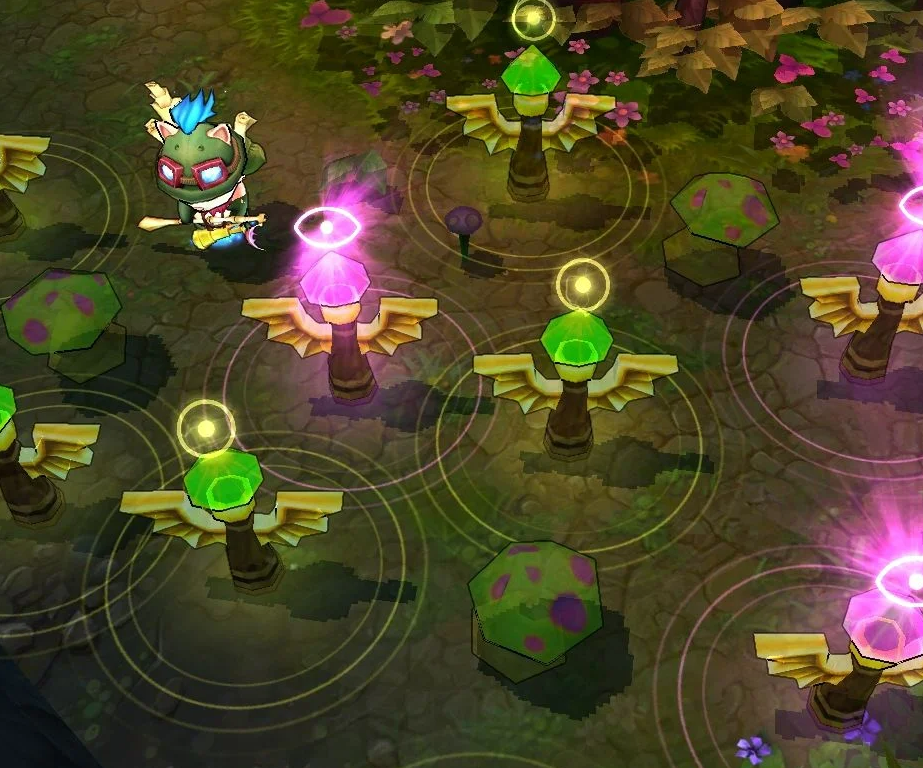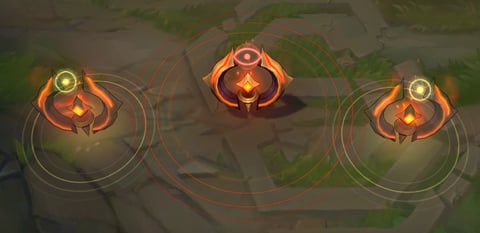
Data Collection: Vision Score and Win Condition
I used the Riot Games API to collect match data on both low elo and professional LoL players to see if we could explore any correlation between vision scoring and win conditions.
Introduction
The competitive world of League of Legends is a game of strategy, teamwork, and skill. As any player knows, vision control is an integral part of winning games, and the game provides a metric for measuring it: the Vision Score. In this blog post, we will explore whether there is a correlation between Vision Score and winning games. To do this, we collected data from Riot Games’ API and will analyze it in later blog posts. Today, we will discuss the steps we took to collect and process the data, and later, the insights we uncovered and the implications for players looking to improve their chances of winning. Let’s dive into the world of data analysis and League of Legends!

Data Collection
Tools
I used Python to complete this project as well as the Requests package, and the RiotWatcher package made specifically to call data from Riot’s API.
Step 1: Obtain the API Key
It’s easy to obtain an API key from Riot Games. At this site you can request an API key that will expire 24 hours after you request it. So over the course of a week I’ve had to request a new one a couple of times.

You can also find all the different endpoints available here. This allows you to find the code to query it yourself, or you can even use it to generate the information directly for you if you want the output fast.
Step 2: Setting Up Your Code
You will need to perform an install of the RiotWatcher package.
pip install riotwatcher
Then you will need the following libraries.
from riotwatcher import LolWatcher, ApiError
import pandas as pd
import requests
Step 3: Get Account Data
Since Riot doesn’t let you pull all accounts (nor do we want that) you must preselect the accounts that you want to review their match history. I’ve chosen 10 accounts we will pull 20 games each from for a total of 200 matches (observations) to look at.
The accounts are a mix of high elo and low elo, or more simply, good players and bad players.
To get this data, you need to request the selected accounts’ PUUIDs, a unique identifier linked to eaah account. You can do this with your account, I am just using my account name, ‘staticcasttype’. Notice I directly included the API key I used because it is expired already.
api_key = 'RGAPI-b011ea28-c1b1-4d7b-8dca-0426325bb69a'
watcher = LolWatcher(api_key)
server = 'na1'
summoner_name = 'staticcasttype'
summoner = watcher.summoner.by_name(server, summoner_name)
puuid = summoner['puuid']
After obtaining the PUUIDs for each account, I made a dictionary of the summoner username, the PUUID, and their region, so I could iterate through each account and put their information into a data frame easier and more quickly than doing that separately. However, since the Riot API limits your requests, it is a good idea to break up your data so you don’t get invalid request returns. I divided my accounts between low and high elo.
summoner_info_amateur = {0 : ['staticcasttype', 'smgDcZQRcPVnIJJUIdn-cyLhMtOzWW1pYub1fkK_inI8_Wh2hFK7q3deneMNRnYxhMa5Pvw-u9MGdQ', 'americas'],
1 : ['binchicken', 'vZOoJBb5_Wy6LJCr0jcS4GWfdg9CH5gBJJDEHdCBMLM5vjUSARdZ4oWH-6wqjCs-rxlIusxDIFUFHQ', 'americas'],
2 : ['Ryechus', 'HDC_2SprVQSVjgRt3rOJnY-tM_xenBR76x0fb1P5KODbLcN0ZPiI3zZJ1a5UkJXE8pqRxmX_AJQ3eQ', 'americas'],
3 : ['alphabetcat', 'hTuGHUYHBLnVZzV_XzBhTbVS1AkbXIttIxB6UsLat58TN3OuchROJHTHxeHL31Nz2GmsL8TrhiXleg', 'americas'],
4 : ['white ibis', 'CcEZ4CeuM5hZn9GQW_QUKkljXhHkQlzJ6mOGA36urZ9QlRi33OI7I9H4oTUoCxQ_v-BLThQQy3m6JA', 'americas'],
}
I also made a list of all the PUUIDs for easier reference later on.
puuids = ['HXXcmPG5mKETeTvMkA_T3rv5gKGhz8wogsCUWv0aNdKKrSBKe20_NokHFi3KUqexkA-Jsmqr7KRohg', '9mTvANPkfm_ehL1RWAavzJZ7Ctd9xGnThpgN8QZLISdr-KMEFPK_c3sorNJ7SSMnkxDmhQpJLUhETA',
'NHvBUFjBoPkeg2YNKtbGnZAJ57tr5RanqJksuMely_FoK8HETjCht6J4utQOD8gbvBOKP0Gqg4r1PQ', 'JVoKe_2_L1Jz4Yosn2nyQJcDR0xF1jvZaCj9Sa9TKsy72G_8wsGmT9yIzyUYtkHqMsvcbQ3sA2Onzw'
'2hYuhnqt0QGURvf_ij-cK2dZambeerWYG29To0PxXKBBz36lP_zALzT9q80fMLfiJilZB0Yri4rTqg', 'smgDcZQRcPVnIJJUIdn-cyLhMtOzWW1pYub1fkK_inI8_Wh2hFK7q3deneMNRnYxhMa5Pvw-u9MGdQ',
'vZOoJBb5_Wy6LJCr0jcS4GWfdg9CH5gBJJDEHdCBMLM5vjUSARdZ4oWH-6wqjCs-rxlIusxDIFUFHQ', 'HDC_2SprVQSVjgRt3rOJnY-tM_xenBR76x0fb1P5KODbLcN0ZPiI3zZJ1a5UkJXE8pqRxmX_AJQ3eQ',
'hTuGHUYHBLnVZzV_XzBhTbVS1AkbXIttIxB6UsLat58TN3OuchROJHTHxeHL31Nz2GmsL8TrhiXleg', 'CcEZ4CeuM5hZn9GQW_QUKkljXhHkQlzJ6mOGA36urZ9QlRi33OI7I9H4oTUoCxQ_v-BLThQQy3m6JA']
Step 4: Requesting MatchIDs With Account Data
Next, I made two, or however many dictionaries you made to break up request times, separate lists to store the matchIDs. For ease of running, I duplicated the loops and changed the names of the lists to match.
amateur_matches = []
for user in range(5):
summoner_name = summoner_info_amateur[user][0]
region = summoner_info_amateur[user][2]
puuid = summoner_info_amateur[user][1]
matchlist_url = f'https://{region}.api.riotgames.com/lol/match/v5/matches/by-puuid/{puuid}/ids'
params = {'api_key': api_key}
response = requests.get(matchlist_url, params=params)
match_ids = response.json()
print(match_ids) # Use this to check if it is catching the IDs or if you get request timed-out.
# Use the match IDs to retrieve the details for each match
for match_id in match_ids:
match_url = f'https://{region}.api.riotgames.com/lol/match/v5/matches/{match_id}'
response = requests.get(match_url, params=params)
match_data = response.json()
amateur_matches.append(match_data)
Which will return a list of matchIDs that will look something like this.
NOTE: Each username will return the 20 most recent games.
['NA1_4603604702', 'NA1_4603585297', 'NA1_4603572865', 'NA1_4603418804', 'NA1_4603383476', 'NA1_4603354728', 'NA1_4598815302', 'NA1_4598794292', 'NA1_4598773252', 'NA1_4598748127', 'NA1_4598336448', 'NA1_4598303667', 'NA1_4598273712', 'NA1_4598013655', 'NA1_4597995969', 'NA1_4597969133', 'NA1_4597947847', 'NA1_4595651152', 'NA1_4595613524', 'NA1_4595590485']
['NA1_4603633393', 'NA1_4603559905', 'NA1_4600075100', 'NA1_4600038821', 'NA1_4599988273', 'NA1_4598417241', 'NA1_4598375527', 'NA1_4597533475', 'NA1_4597514492', 'NA1_4597504896', 'NA1_4593476789', 'NA1_4593452337', 'NA1_4593441905', 'NA1_4593418132', 'NA1_4593388278', 'NA1_4593053027', 'NA1_4593028434', 'NA1_4592926754', 'NA1_4592895152', 'NA1_4587257018']
['NA1_4545116508', 'NA1_4545069206', 'NA1_4533195909', 'NA1_4533135946', 'NA1_4531045333', 'NA1_4531032874', 'NA1_4531011847', 'NA1_4493629097', 'NA1_4493586951', 'NA1_4493540400', 'NA1_4478426048', 'NA1_4457448380', 'NA1_4457422789', 'NA1_4457375337', 'NA1_4455467146', 'NA1_4455502730', 'NA1_4455419174', 'NA1_4455434865', 'NA1_4455450913', 'NA1_4455385558']
['NA1_4603656272', 'NA1_4603553086', 'NA1_4603504636', 'NA1_4602058892', 'NA1_4601926967', 'NA1_4600402951', 'NA1_4600367079', 'NA1_4600332625', 'NA1_4600247741', 'NA1_4597876466', 'NA1_4597868737', 'NA1_4596661213', 'NA1_4596622349', 'NA1_4596597858', 'NA1_4596164485', 'NA1_4596028568', 'NA1_4596014443', 'NA1_4595335488', 'NA1_4595313623', 'NA1_4595283734']
['NA1_4600986875', 'NA1_4600944073', 'NA1_4600075100', 'NA1_4600038821', 'NA1_4599988273', 'NA1_4599933620', 'NA1_4599844392', 'NA1_4599772492', 'NA1_4599737705', 'NA1_4598417241', 'NA1_4598375527', 'NA1_4593798123', 'NA1_4593772656', 'NA1_4593476789', 'NA1_4593452337', 'NA1_4593441905', 'NA1_4593418132', 'NA1_4593388278', 'NA1_4593352175', 'NA1_4593334765']
Lastly, I’d like to combine all my lists into one list now so I have an easier time accessing information from one place and I’m done making requests.
matches = [pro_matches, amateur_matches]
Step 5: Variable Selection and Data Extraction
Since I’m only interested in vision metrics and the win/loss outcome, I’ve skimmed through all the data recorded in {matches} and decided on a few relevant details. I made a dictionary with empty lists that I can append new data I read into it later.
match_dict = {'teamPosition': [], 'visionScore': [],
'visionWardsBoughtInGame': [], 'wardsKilled': [], 'wardsPlaced': [],
'win' : []}
And then I will loop through the data in {matches} and dead it into my dictionary.
for elo in range(len(matches)):
for game in range(len(matches[elo])):
if 'info' in matches[elo][game]:
for participant in range(len(matches[elo][game]['info']['participants'])):
if str(matches[elo][game]['info']['participants'][participant]['puuid']) in puuids:
match_dict['teamPosition'].append(matches[elo][game]['info']['participants'][participant]['teamPosition'])
match_dict['visionScore'].append(matches[elo][game]['info']['participants'][participant]['visionScore'])
match_dict['visionWardsBoughtInGame'].append(matches[elo][game]['info']['participants'][participant]['visionWardsBoughtInGame'])
match_dict['wardsKilled'].append(matches[elo][game]['info']['participants'][participant]['wardsKilled'])
match_dict['wardsPlaced'].append(matches[elo][game]['info']['participants'][participant]['wardsPlaced'])
match_dict['win'].append(matches[elo][game]['info']['participants'][participant]['win'])
Finally, with {match_dict} all filled out, I will turn it into a data frame with pandas.
match_df = pd.DataFrame(match_dict)
{match_df} should now output

Reflection
There are some missing values in the data that need to be cleaned, which will put us considerably under the 200 observation expectation for this project, but this can easily be solved by throwing in a few additional summoner accounts to gain new observations from. Since I coded this extraction technique to work well with lists of any size, and multiple starting dictionaries (username/PUUID/region), it would be no problem to introduce additional observations into the data.
In my next post, I’ll do a little bit of analysis on the data to see just how impactful vision is in games. As a support main, I care a lot about warding, and it is one of my top priorities when I play, so I’m interested to see if what I lack in DPS, I more than make up for with map control and itemization.
Through this portion of the project, I learned that there is a lot you can do with Riot’s API. Please consider using my method (or let me know of other ways) to collect other information from matches for data analysis of what elements are conducive to game-winning conditions.